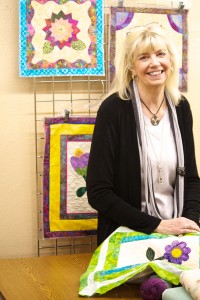By Charlotte Hechler
hechlerc@grinnell.edu
“The Edward Scissorhands,” unlike its namesake, is a quilt boasting vibrant colors that create a sharp, jagged and very modern pattern. This is just one of the many creative quilts that self-taught quilter and owner of Cornerstone Quilts (928 Main St), Lee Plisch has stitched up. Plisch took up the art of piecing together fabrics just twelve years ago as a casual hobby, but to her surprise it became a long-lasting passion and career.

Her shop, Cornerstone Quilts on Main Street, relocated last month from Newton, Iowa. The store is filled with everything from squares of colored fabric to threads of every color to spectacular quilts that Plisch crafted herself. Each of the quilts displayed in her store is unique in its use of color, texture and pattern. There are reconstruction quilts from the Civil War and the 1930s, and more modern pieces, such as “The Edward Scissorhands.”
When designing her quilts, Plisch employs creative decisions that produce quilts with much movement.
“I don’t stick to a whole lot of rules,” she said. “I mix all different kinds of fabrics, and all different kinds of textures.”
The creative license in quilt making is what Plisch enjoys most about her art. “It’s the creativity that I love,” she said. “I mean I love it from start to finish. There isn’t a part of it that I don’t—from picking the pattern, to the fabric, to piecing it, to quilting it, to finishing it.”
To Plisch, both the process of making quilts and the final product are very valuable.
“I think every quilt has a story,” she said, “it was grandma’s or I bought it, I started it—somebody else finished it.”
Plisch believes the quilt’s connection to narrative derives from its past use. Quilt making used to be a necessity, as quilts served as the main blankets on the bed. They have also been historically tied to heritage and for this reason, Plisch believes quilts still represent comfort and human connection.
Plisch aims to transfer her creative passion to others by teaching classes at Cornerstone Quilts. Her classes include beginning and intermediate quilting classes. Recently, Plisch has been trying to reach out to more people and cater to their individual artistic interests.
“[People] want to do home dec., bags, baby stuff,” she said. “They’re not necessarily quilters. So we’re trying to reach to those people too.”
Plisch has therefore been in the process of developing the range of courses offered, and expanding the kinds of products sold in her store. For example, she has ordered yarn for customers who enjoy knitting and crocheting.
Moreover, many of her new classes incorporate an aspect of social-change, in particular to accommodate younger customers.
“[The college-student] age group is coming up and wanting recycling [projects],” she said. “Going green is really important. So were doing a lot more that has to do with recycling.”
Plisch has designed courses in which her students learn to make mittens out of old donated wool sweaters, and vests out of men’s suit coats. Additionally, there are groups that come in to Plisch’s shop to work with donated materials on service projects, such as making quilts for nursing homes and hospitals, and pillows to be sent overseas.
As part of her expansion, Plisch will construct a workspace on the second level of her shop. She plans to put donated sewing machines, fabric and art books in the room for anyone to use free of charge. She hopes that with this change, more Grinnell College students who typically do not own sewing machines will be able to join the quilting, sewing and knitting community, and have the opportunity to share her passion.
“There’s nothing more wonderful than getting a gift of a quilt,” Plisch said.

















































